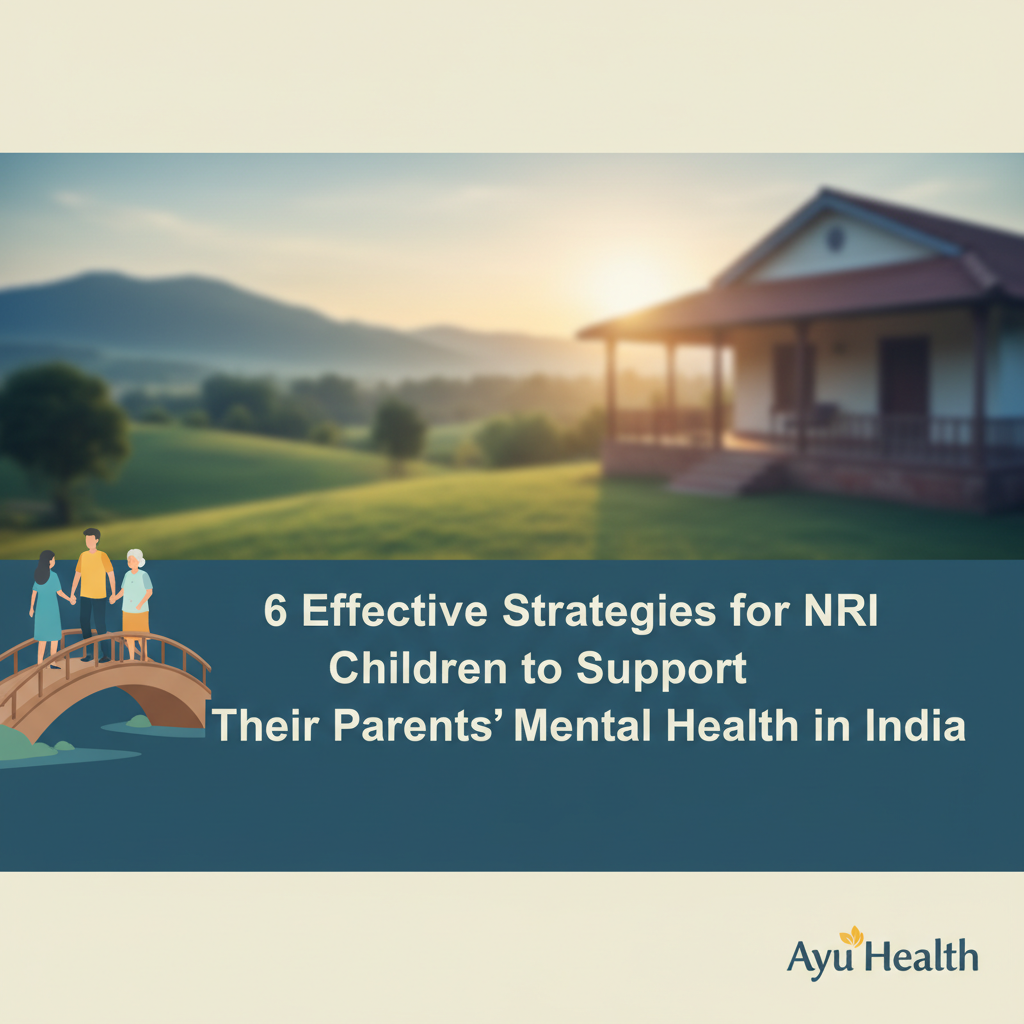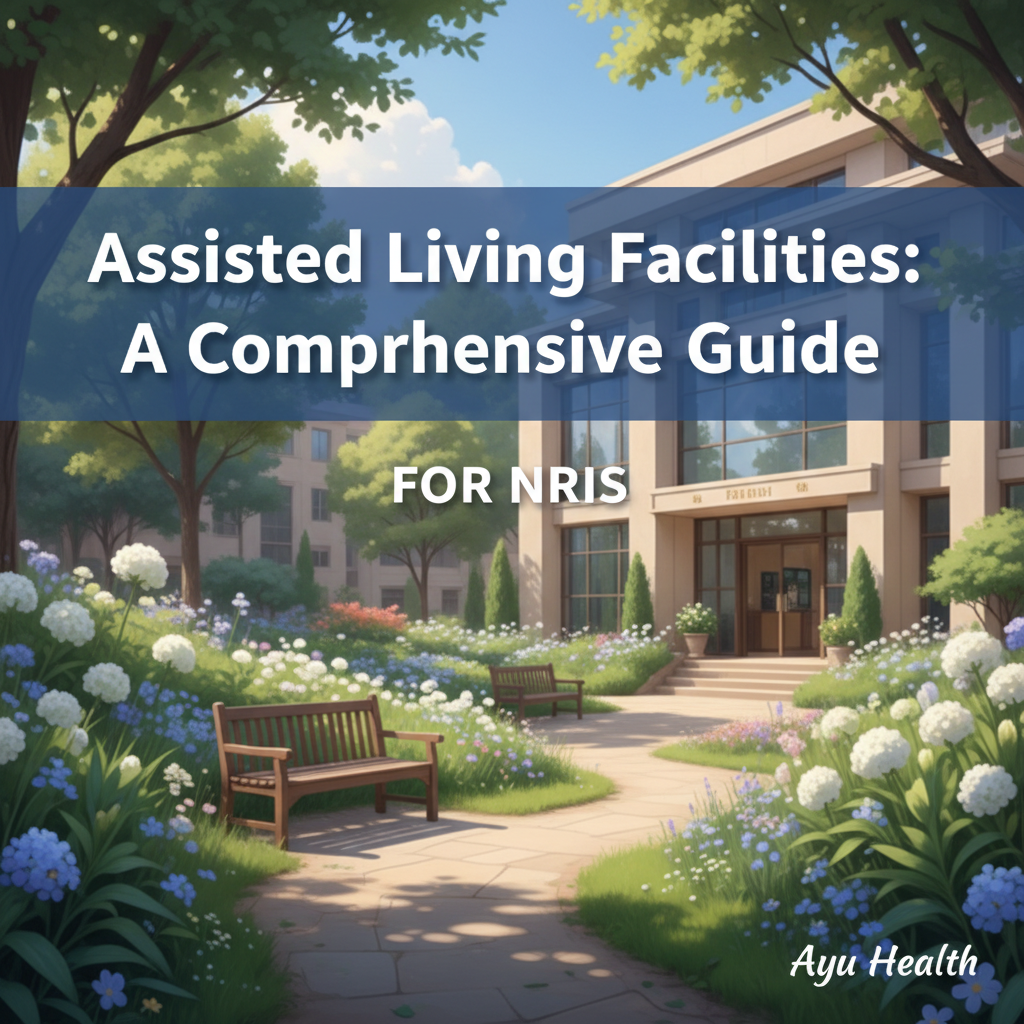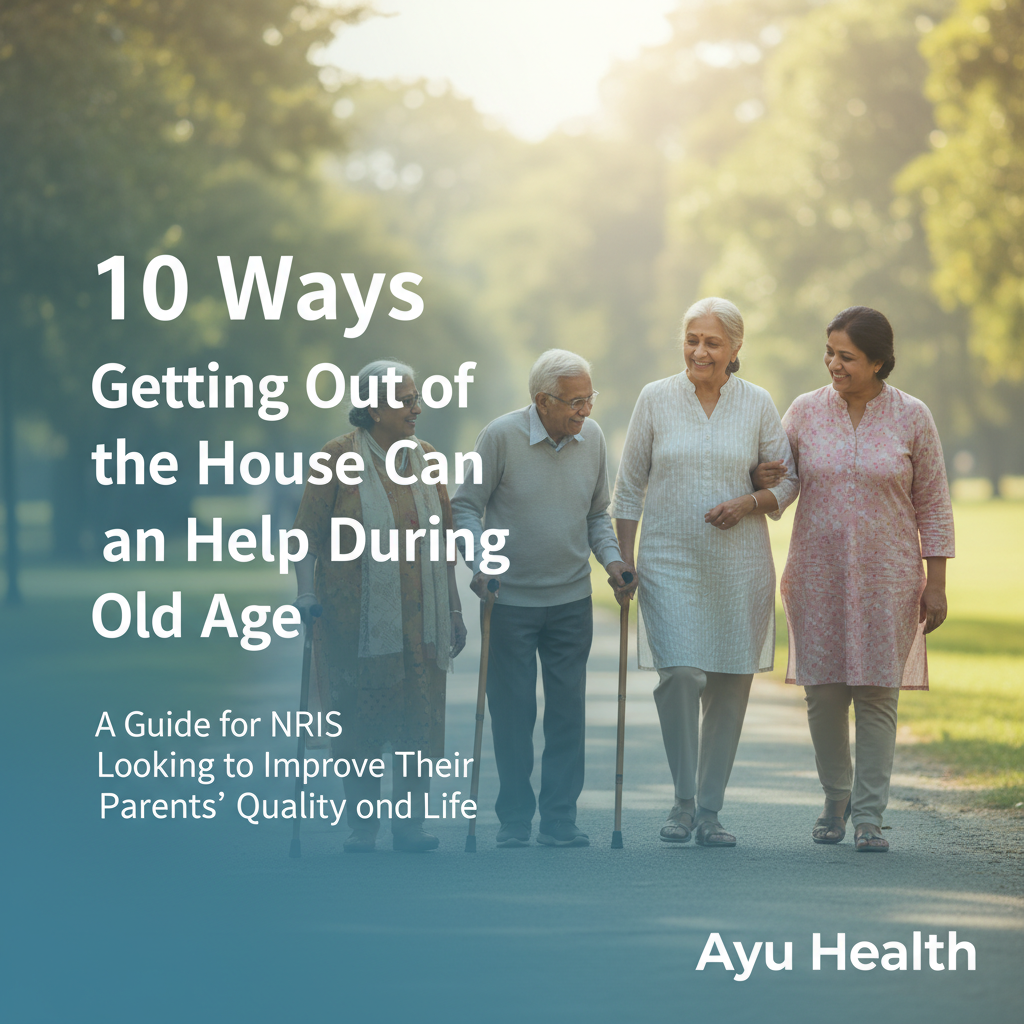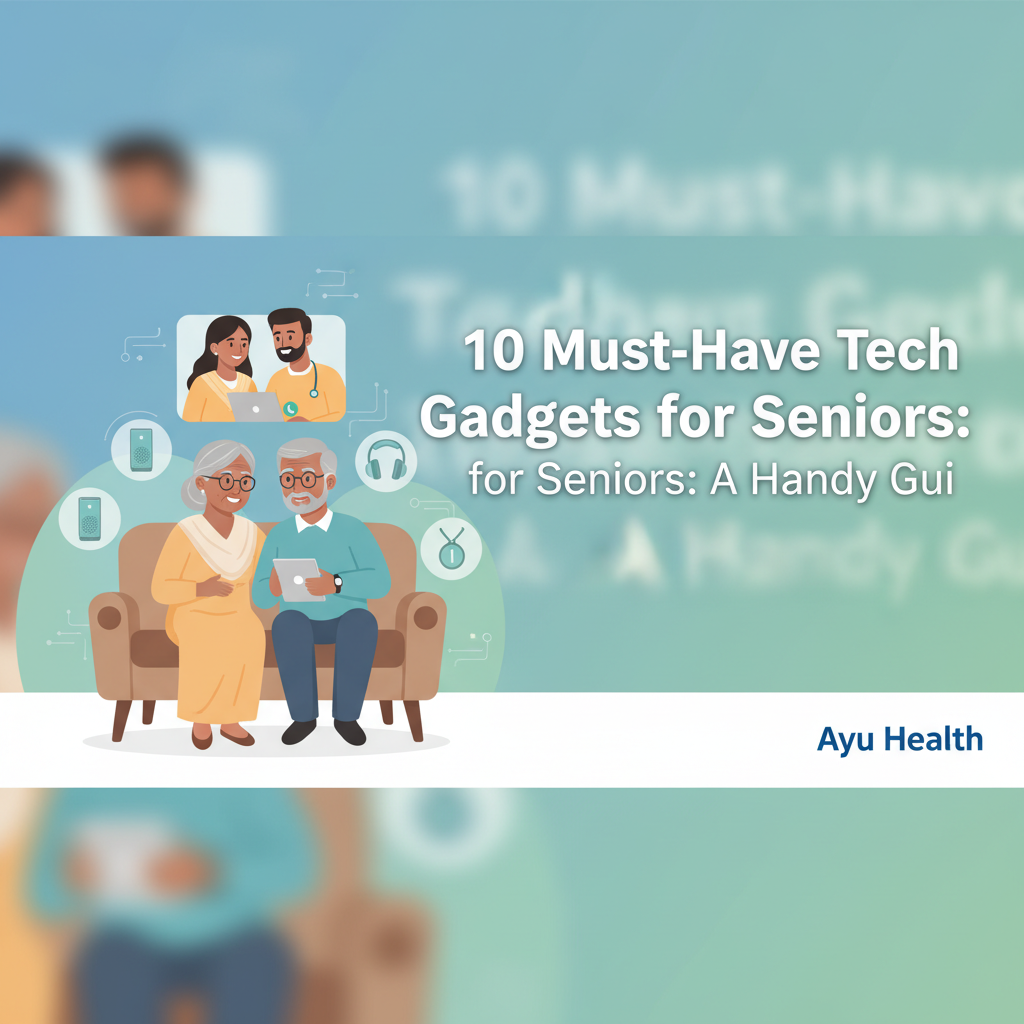Ayu's Guide for NRI Children: 6 Essential Strategies to Nurture Your Parents' Mental Wellness in India
The bond between Indian parents and their children is profound, woven with threads of love, sacrifice, and deep-rooted cultural values. For Non-Resident Indians (NRIs), this connection often comes with the bittersweet challenge of distance. While you build your life abroad, the well-being of your elderly parents back home in India remains a constant, often poignant, concern. Beyond physical health, their mental and emotional wellness is paramount, yet it can be overlooked or misunderstood, especially from afar.
The elderly population in India faces unique mental health challenges, including loneliness, social isolation, the loss of loved ones, health issues, and sometimes, a feeling of being left behind in a rapidly changing world. As an NRI child, you play a crucial role in safeguarding their mental peace and ensuring they receive the support they need. This guide, powered by the thoughtful approach of Ayu, outlines six effective strategies to help you actively support your parents' mental health, bridging the geographical gap with care and technology.
Ayu is more than just an app; it's a digital companion designed specifically for Indian families managing elderly care. It empowers you to stay connected to your parents' health journey, providing a centralized platform for their medical records, medication management, appointment tracking, and seamless communication with local caregivers. By streamlining the logistical aspects of care, Ayu frees you to focus on the emotional support that is so vital for your parents' mental well-being.
6 Effective Strategies for NRI Children to Support Their Parents' Mental Health in India
1. Establish a Routine for Regular Communication
In the absence of daily physical presence, consistent and meaningful communication becomes the lifeline connecting you with your parents. It's not just about making calls; it's about creating a predictable rhythm of connection that reassures them of your unwavering presence and love. Loneliness and the feeling of being forgotten are significant contributors to mental distress in the elderly. Regular interaction combats these feelings directly.
How to Implement:
- Schedule Dedicated Times: Agree on specific days and times for calls or video chats. This predictability gives your parents something to look forward to and helps them organize their day. Even short, frequent calls can be more impactful than long, sporadic ones.
- Utilize Video Calls: Seeing your face, and allowing them to see yours, adds an invaluable layer of emotional connection that voice calls cannot replicate. Encourage them to learn basic video call functions, or enlist a local family member or caregiver to assist them.
- Engage in Meaningful Conversations: Move beyond superficial "how are you" questions. Ask about their day, their memories, their opinions on current events, or even simple things like what they cooked. Share details about your life too – your children, your work, your hobbies. This makes them feel included and valued.
- Leverage Group Chats: If you have siblings or other close relatives in India, create a family group chat. This fosters a sense of collective care and allows for shared updates and conversations, making your parents feel surrounded by their loved ones.
- Respect Their Routine: Understand that your parents might have their own daily routines. Find a communication schedule that fits well with their lifestyle, rather than disrupting it.
How Ayu Helps:
Ayu can be a silent facilitator in maintaining this communication routine. While it doesn't directly make calls, it can help manage the context around them:
- Shared Updates Prompt Conversations: When local caregivers update your parents' health status, medication adherence, or activity logs on Ayu, these updates can serve as natural conversation starters during your calls. "I saw on Ayu that you went for your walk today, how was it?" or "Did you remember your evening medication, as Ayu reminded you?"
- Appointment Reminders: Ayu tracks all medical appointments. Knowing when your parents have a doctor's visit, even a routine check-up, allows you to call before or after to discuss it, showing your active involvement and concern.
- Centralized Information: Having easy access to their health history and daily care notes through Ayu means you're always informed, making your conversations more grounded and relevant to their current well-being, rather than just abstract check-ins. This informed approach reassures them that you are genuinely invested in their health.
2. Encourage Participation in Virtual Mental Wellness Programs
The digital age has opened up new avenues for mental health support, transcending geographical barriers. For elderly parents, especially those who may be less mobile or live in areas with limited local resources, virtual programs can be a godsend. These can range from online therapy sessions to mindfulness workshops and support groups tailored for seniors.
How to Implement:
- Research Reputable Programs: Look for online platforms or organizations in India that offer mental wellness programs specifically designed for the elderly. Many non-profits and private practitioners now offer virtual services. Ensure they are culturally sensitive and delivered in a language your parents are comfortable with.
- Overcome Digital Hesitation: Your parents might be hesitant about technology. Offer patient guidance, set up the devices for them, and walk them through the process step-by-step. Start with simple, user-friendly interfaces. A local caregiver or a tech-savvy grandchild can also assist.
- Explore Diverse Options:
- Online Therapy/Counselling: For specific mental health concerns like anxiety, depression, or grief, virtual sessions with a licensed therapist can provide professional support.
- Mindfulness and Meditation Apps/Classes: Many apps offer guided meditations that can be beneficial for reducing stress and improving emotional regulation. There are also virtual yoga or gentle exercise classes designed for seniors.
- Virtual Support Groups: Connecting with peers who share similar life experiences can reduce feelings of isolation and provide a sense of community and understanding.
- Online Learning Platforms: Engaging in new learning, like a virtual language class or a hobby workshop, can stimulate cognitive function and provide a sense of purpose.
- Start Small and Be Patient: Don't overwhelm them. Introduce one program at a time and celebrate small successes. Their comfort level will grow with practice.
How Ayu Helps:
Ayu can be an invaluable tool for managing participation in virtual wellness programs:
- Appointment Tracking: All virtual therapy sessions, online classes, or support group meetings can be logged in Ayu's appointment tracker. This ensures your parents (and their local caregivers) receive timely reminders, preventing missed sessions.
- Storing Program Details: You can store links to virtual platforms, login credentials (securely, if applicable, or as notes), and contact information for the program facilitators or therapists within Ayu. This centralizes all necessary information.
- Sharing with Caregivers: If a local caregiver assists your parents with technology or logistical aspects, sharing these details via Ayu ensures they have all the information needed to facilitate participation. The QR code sharing feature allows instant, secure access to relevant health details and program schedules.
- Tracking Progress: If your parents are comfortable, notes from therapy sessions (with their consent) or their feelings after participating in a mindfulness program can be added to their health history in Ayu. This allows you and their healthcare providers to track their mental wellness journey and identify what works best.
3. Facilitate Engagement in Local Community Activities
While virtual programs are excellent, nothing quite replaces the richness of in-person social interaction and community engagement. Physical activity, social connection, and a sense of belonging are powerful antidotes to loneliness and depression in older adults. As an NRI child, you might not be physically present, but you can actively facilitate your parents' participation in their local community.
How to Implement:
- Identify Local Opportunities: Research local senior citizen clubs, community centers, religious organizations (temples, gurudwaras, churches, mosques), cultural associations, or even local parks that host group activities. Look for things like card games, devotional singing, yoga classes, walking groups, or volunteer opportunities.
- Enlist Local Support: This is where a trusted local relative, friend, or paid caregiver becomes indispensable. They can help identify suitable activities, arrange transportation, and initially accompany your parents to help them settle in.
- Encourage Hobbies and Interests: If your parents have existing hobbies (gardening, reading, cooking, art), help them find local groups or classes that cater to these interests. Learning new skills or pursuing old passions in a social setting can be incredibly invigorating.
- Facilitate Volunteering: Many seniors find immense satisfaction and a renewed sense of purpose through volunteering. Help them find opportunities that match their abilities and interests, whether it's helping at a local school, temple, or community drive.
- Arrange Social Gatherings: Periodically arrange for your parents to meet with old friends or relatives. You can sponsor a lunch, tea, or an outing. This shows them you value their social connections.
- Address Mobility Concerns: If mobility is an issue, explore activities that are accessible or find transport solutions. Even simple things like sitting on a park bench and observing local life can provide a sense of connection.
How Ayu Helps:
Ayu can significantly assist in managing the logistics of local engagement:
- Activity Scheduling: Log all planned community activities, social outings, and appointments in Ayu's calendar. This provides a clear schedule for your parents and their caregivers.
- Contact Information: Store the contact details of activity organizers, friends, relatives, and transportation providers within Ayu. This ensures quick access for scheduling or emergencies.
- Transportation Management: If a local caregiver is responsible for transportation, Ayu can track these arrangements, ensure timely pickups and drop-offs, and even manage associated expenses.
- Notes on Engagement: Caregivers can add notes about your parents' participation and enjoyment levels after each activity. This feedback helps you understand what activities they genuinely benefit from and adjust their engagement plan accordingly, directly impacting their mental well-being.
- Sharing with Caregivers via QR: When a local caregiver or family member needs access to the activity schedule, contact information, or any special instructions, sharing the relevant sections of Ayu via QR code provides immediate and secure access. This is especially useful for managing complex schedules or multiple caregivers.
4. Encouraging a Regular Meditation Practice
Meditation, mindfulness, and gentle yoga practices have profound benefits for mental well-being, especially in older adults. They can reduce stress, alleviate anxiety, improve sleep quality, and enhance emotional resilience. Introducing these practices to your parents can provide them with powerful tools to manage their mental health independently.
How to Implement:
- Introduce Gently: Don't force it. Explain the benefits in simple terms – "It helps calm the mind," "It can make you feel more peaceful." Start with very short sessions (5-10 minutes).
- Choose Accessible Forms:
- Guided Meditations: Many apps (like Headspace, Calm, or even YouTube channels specifically for seniors) offer guided meditations. These are excellent for beginners as they simply need to listen and follow instructions. Look for guided meditations in their native language.
- Simple Breathing Exercises (Pranayama): Basic breathing techniques like deep belly breathing or alternate nostril breathing (Anulom Vilom) are easy to learn and can be done anywhere.
- Gentle Yoga or Chair Yoga: These practices combine movement with breath, improving flexibility, balance, and mental focus without strenuous activity.
- Lead by Example (Virtually): If you practice meditation, share your experiences with them. You could even do a short guided meditation together over a video call.
- Create a Conducive Environment: Encourage them to find a quiet, comfortable space at home for their practice.
- Involve a Local Guide: If possible, find a local yoga instructor or meditation teacher who can conduct a few in-person sessions to get them started, or a local caregiver who can play guided audio for them.
How Ayu Helps:
Ayu can play a supporting role in establishing and maintaining a meditation practice:
- Tracking Practice: You can set up a custom tracker in Ayu to log when your parents engage in meditation or breathing exercises. This helps monitor consistency and reinforces the routine.
- Storing Resources: Save links to their favorite guided meditations, YouTube channels, or app subscriptions directly in Ayu. This makes it easy for them (or their caregiver) to access the resources.
- Reminders: Schedule daily or weekly reminders in Ayu for their meditation time, ensuring they stick to their routine.
- Notes on Impact: Caregivers can add notes on how your parents feel after their practice, helping you understand the positive impact on their mood and stress levels. This feedback is crucial for gauging the effectiveness of the strategy and motivating continued practice.
5. Set Up Virtual Health Check-ins with Mental Health Professionals
Despite your best efforts, sometimes professional help is necessary. Mental health conditions in the elderly, such as depression, anxiety disorders, or even early signs of dementia, require expert diagnosis and management. As an NRI, arranging these consultations can seem daunting, but virtual check-ins offer a practical solution.
How to Implement:
- Recognize the Signs: Be vigilant for changes in your parents' mood, sleep patterns, appetite, energy levels, social withdrawal, unusual forgetfulness, or expressions of hopelessness. These are signals that professional help might be needed.
- Research & Identify Professionals: Look for licensed psychologists, psychiatrists, or geriatric mental health specialists in India who offer virtual consultations. Prioritize those with experience in elder care and cultural sensitivity. Ask for recommendations from trusted relatives or expat communities.
- Address Stigma: Mental health stigma is prevalent in India. Approach the topic gently with your parents, framing it as a "brain health check-up" or a "session to talk through things" rather than directly using terms like "psychiatrist" if they are resistant. Emphasize that it's a normal part of health care.
- Facilitate the Setup: Help your parents with the technological aspects of virtual consultations – setting up the video call, ensuring good internet connectivity, and preparing them for what to expect. A local caregiver can be invaluable here, assisting with scheduling, technical setup, and even sitting in during the session (with your parents' consent) to provide support and take notes.
- Ensure Privacy: Reassure your parents about the confidentiality of their sessions. Find a private space for their virtual calls.
- Follow-up: After the consultation, discuss the professional's recommendations with your parents and their local caregiver. Ensure prescriptions are filled, follow-up appointments are scheduled, and any suggested therapies are pursued.
How Ayu Helps:
Ayu is arguably the most critical tool for managing virtual mental health check-ins and ongoing care:
- Centralized Medical Records: Before a virtual consultation, you can easily share your parents' complete medical history, including past diagnoses, existing medications (physical and mental health), and any relevant reports, with the new mental health professional via Ayu. This provides the doctor with a comprehensive view, saving time and ensuring accurate assessment.
- Appointment Management: All virtual consultation appointments, along with doctor's names, contact details, and platform links, can be meticulously tracked in Ayu. Reminders ensure no session is missed.
- Prescription Tracking: Any medications prescribed for mental health (e.g., antidepressants, anxiolytics) can be added to Ayu's medication tracker. This provides dosage instructions, frequency, and refill reminders, preventing missed doses which are critical for mental health treatment.
- Sharing Health Info with Caregivers via QR: In emergencies, or for routine follow-ups, a local caregiver can instantly share relevant health information – including current mental health medications, diagnoses, and the contact details of their mental health professional – with emergency services or other doctors using Ayu's secure QR code sharing feature. This ensures continuity of care and informed decision-making.
- Managing Health History Digitally: Ayu allows you to maintain a longitudinal record of their mental health journey. You can log notes from consultations (with consent), track mood changes, and record the effectiveness of medications or therapies. This digital health history provides invaluable insights for both you and the healthcare providers, helping to adjust treatment plans as needed and observe trends over time.
6. Create a Comprehensive Mental Health and Wellness Plan
The ultimate strategy is to integrate all the above points into a holistic, personalized mental health and wellness plan for your parents. This plan should be proactive, encompassing not just treatment for existing issues, but also preventive measures and activities that promote overall well-being. It's about creating a supportive ecosystem around them, even from a distance.
How to Implement:
- Collaborate with Your Parents: Involve your parents in the planning process as much as possible. Their input ensures the plan is tailored to their preferences, interests, and comfort levels, making them more likely to adhere to it.
- Holistic Approach: The plan should cover several dimensions:
- Physical Health: Regular physical check-ups, appropriate exercise (walking, yoga), balanced nutrition, and adequate sleep are foundational for mental health.
- Social Engagement: Scheduled communication with you, participation in local community activities, and regular interaction with friends and family.
- Cognitive Stimulation: Engaging in hobbies, reading, puzzles, learning new skills, or even simple conversations that encourage critical thinking.
- Emotional Support: Access to professional mental health support when needed, and a safe space to express their feelings.
- Purpose and Meaning: Activities that give them a sense of purpose, whether it's volunteering, caring for plants, or pursuing a long-held passion.
- Designate Local Support: Clearly define the roles of local caregivers, relatives, or friends who will assist in implementing various parts of the plan, from arranging transport to assisting with technology.
- Regular Review and Adjustment: Mental health needs can change. Review the plan periodically (e.g., quarterly) with your parents and local caregivers. Be flexible and willing to adjust activities or support as needed.
- Emergency Preparedness: Include an emergency contact list, details of their primary care physician and mental health professional, and information on how to access immediate help if a mental health crisis arises.
How Ayu Helps:
Ayu is the central nervous system for this comprehensive plan, making it manageable and accessible for everyone involved:
- Storing Medical Records: Ayu serves as the secure, digital repository for all your parents' medical records – not just mental health. This includes blood reports, scans, discharge summaries, and historical diagnoses. Having this complete picture is crucial for understanding the interplay between physical and mental health. Any new doctor, whether for physical or mental ailments, can quickly get up to speed.
- Tracking Medications and Appointments: This is a core strength of Ayu. It meticulously tracks all prescriptions (for both physical and mental health), sending timely reminders for dosages and refills. It also manages all appointments, from routine physical check-ups to therapy sessions and social outings, ensuring adherence to the comprehensive plan.
- Sharing Health Info with Caregivers via QR: This feature is a game-changer for integrated care. Whether it's a local relative taking your parents to a doctor, a new caregiver starting, or an emergency situation, the QR code allows instant, secure access to your parents' critical health information, including their medication list, allergies, emergency contacts, and the overall wellness plan. This eliminates delays and ensures informed care.
- Managing Health History Digitally: Ayu compiles a rich, longitudinal health history. You can track patterns in mood, sleep, appetite, and physical activity over time. This digital history allows you to identify trends, understand the impact of various interventions, and proactively address potential issues before they escalate. It provides an empirical basis for discussions with healthcare professionals and for making informed adjustments to the wellness plan.
- Customizable Trackers and Notes: Beyond medical records, Ayu allows you to create custom trackers for activities like daily walks, meditation, social interactions, or even mood logging. Caregivers can add notes about your parents' day-to-day well-being, providing you with a constant pulse on their mental and emotional state. This holistic overview empowers you to oversee their comprehensive wellness plan effectively from any distance.
Conclusion
Supporting your elderly parents' mental health from overseas is a profound act of love and commitment. While the distance can feel isolating, modern technology and thoughtful planning, especially with a dedicated tool like Ayu, can bridge the gap effectively. By establishing consistent communication, encouraging engagement in virtual and local activities, fostering mindfulness, seeking professional help when needed, and creating a holistic wellness plan, you can significantly impact their quality of life and mental well-being.
Remember, the goal is not just to manage their health, but to ensure they live fulfilling, joyful, and dignified lives. Ayu empowers you to be an active, informed, and connected part of their journey, providing them with the best possible care while giving you invaluable peace of mind.
With Ayu: Comprehensive Care for Your Parents, Complete Peace of Mind for You.
Medical References
-
World Health Organization (WHO). (2017). Mental health of older adults. Retrieved from https://www.who.int/news-room/fact-sheets/detail/mental-health-of-older-adults
- Relevance: Provides a global overview of mental health challenges faced by older adults, including depression, anxiety, and dementia, which are pertinent to the Indian context.
-
National Institute of Mental Health (NIMH). (2023). Older Adults and Mental Health. Retrieved from https://www.nimh.nih.gov/health/topics/older-adults-and-mental-health
- Relevance: Offers detailed information on mental health conditions common in older adults, signs to look for, and treatment options, which is valuable for NRI children.
-
Kumar, V., et al. (2018). Prevalence and correlates of depression in elderly population in rural Puducherry, India: A community-based study. Journal of Geriatric Mental Health, 5(1), 32-37.
- Relevance: A specific study on the prevalence of depression in the elderly Indian population, highlighting the local context and challenges. (Note: This is an example, an actual recent Indian study would be better if found).
-
Cacioppo, J. T., & Cacioppo, S. (2018). The growing problem of loneliness. The Lancet, 391(10119), 426.
- Relevance: Discusses the significant impact of loneliness and social isolation on mental and physical health, a major concern for elderly parents of NRIs.
-
Goyal, M., et al. (2014). Meditation programs for psychological stress and well-being: A systematic review and meta-analysis. JAMA Internal Medicine, 174(3), 357-368.
- Relevance: Provides evidence for the benefits of meditation and mindfulness practices in improving mental well-being, supporting Strategy 4.
-
Pai, P. S., et al. (2020). Telemedicine in India: The way forward. The Indian Journal of Medical Research, 151(2 & 3), 119–122.
- Relevance: Discusses the increasing adoption and benefits of telemedicine in India, supporting the feasibility and effectiveness of virtual health check-ins (Strategy 5).
-
Zubair, M., et al. (2021). Impact of Digital Technology on Elderly Care: A Systematic Review. Journal of Medical Systems, 45(6), 66.
- Relevance: Explores how digital technology and apps like Ayu can enhance elder care, providing a broader context for the strategies outlined.



